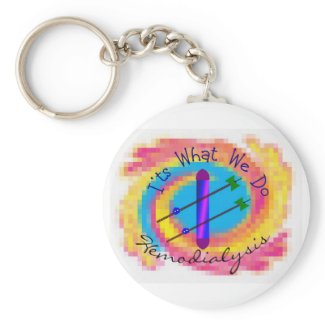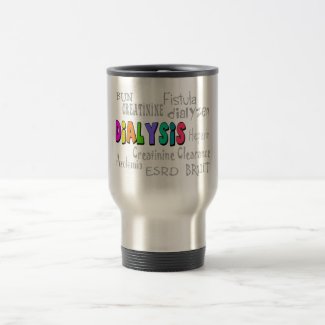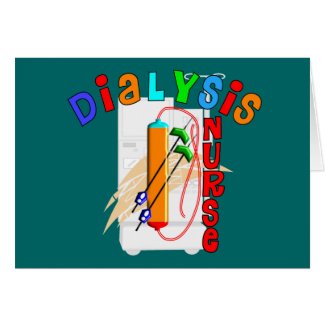Are you considering dialysis nursing and wondering what it entails? Do you wonder if you have what it takes to do the job?
I worked as a dialysis unit right after graduation from nursing school, so I had no experience at all. The unit I worked in was a large, out-patient facility and dialyzed approximately 105 patients per day in 3 separate shifts. It was busy, busy, busy. I also worked on-call dialysis for any acute dialysis needs that occurred after hours and on weekends. This was done at the hospital generally in an ICU, cardiac, burn unit type setting. What could go wrong, DID go wrong, each and everyday. Every single day you work in this field, you will learn something. Just when you think you've seen and experienced it all....something else happens. It's a given and quite interesting as a career choice. Most people who enter dialysis either like it or hate it...and those that like it, remain working in dialysis for their entire working careers. As for me, I did dialysis both chronic (out-patient) and acute (in-patient) for 7 years.

To Purhcase This Shirt Click The Link: http://www.zazzle.com/dialysis_nurse_tech_funny_gifts_t_shirts-235507314940087136?view=113390926697750663&rf=238282136580680600/*
If you are a registered nurse either fresh out of school as a new grad or an experienced RN, then you could be considered for a position as a dialysis nurse. Most nurses entering dialysis as a career do not have prior experience and most all dialysis units have their own training programs.
Training is generally a 6 week program which consists of classroom theory, touring the center and built in water treatment room as well as 1:1 hands on practice by an experienced RN or dialysis educator. You will not be expected to dialyze a patient on your own until you have been deemed fully competent to do so. More importantly, if you don't feel fully competent, speak up. You do not want to dialyze someone unless you absolutely know what you are doing as there are too many things that can go wrong. Pay close attention during your training, ask questions, take notes. In time, it will all become second nature as with anything else you are learning for the first time. However, if I can learn it and be successful doing it---so can you! I must admit, learning dialysis didn't come easy for me, not at all. In fact, I quit after a month, I was scared to death I would injure someone. Not wanting to be defeated, I asked for a second chance a few months later and was kindly given one by the administrator of the unit. In all honesty, I did well and never made any serious errors. However, it wasn't until I worked in the field for over a year did I really feel comfortable. The reason being was again, too many things can go wrong at any given moment.

To Purchase This Key Chain, Click the Link: http://www.zazzle.com/hemodialysis_its_what_we_do_dialysis_nurse_gift_keychain-146552564124270845?rf=238282136580680600*
You will first be taught the dialysis machine, how it functions, how to set it up and prime it for a patient, how to disinfect it and what all the alarms mean. Dialysis machines are all computerized and have built in alarms systems to notify you of high pressures, low pressures, empty fluid containers etc and when a treatment is complete. While working in a dialysis unit, these alarms are sounding almost constantly. Pay attention to them....they alarm for a reason!
Next you will be taught needle insertion into a patient's AV-graft or AV-fistula as well as starting dialysis via a central line in the internal jugular, subclavian or femoral area. The central lines are always double access ports, one to withdraw blood and the other to return dialyzed blood. You will also learn central line dressing changes and how to de-clot these catheters in the unit as well as removing them once they are discontinued.

To Purchase This Mug, Click the Link: http://www.zazzle.com/dialysis_terminology_gifts_mugs-168573549951692781?rf=238282136580680600*
As a rule in most centers, you will begin dialyzing just one patient at a time and slowly progress to 3-4 patients if you're working in an out-patient center. As an RN, you will also be responsible for administering any and all IV meds during treatments, units of blood if needed, IV antibiotics and IV iron supplements to name a few.
Working as a dialysis nurse can be stressful both physically and mentally. You will need to be quick on your feet and organized as everything is time oriented. There's some lifting involved such as removing large bags of contaminated trash at end of each treatment session, carrying heavy containers of solutions, assisting patients in and out of chairs and off of gurneys, depending on the unit you are in. As for patient teaching, it will be on-going and daily. Dialysis patients and their families require support and education as far as meds, diet and fluid allowances.
When you are dialyzing patients, you always want to pay attention to them and their machines, even if they aren't alarming. For example, a needle in a patient's arm can become dislodged or fall out. Under normal circumstances, the machine would alarm for the loss of pressure. However, if the needle/tubing that fell out is against the side of the chair and the patient's arm is applying the right amount of pressure, the machine may not detect it. The patient may be asleep...and in a matter of a minute or two....a patient can lose a large amount of blood---onto the floor and behind the chair they're sitting in, without anyone knowing it. The amount of blood removed is anywhere from 400ml.min-600ml/min. So yes, exsanguination is entirely possible and does happen, especially partial exsanguinations. I've seen it, many times and trust me, it's not pretty! So no matter how long you've worked as dialysis nurse or tech, always, always keep a close eye on your patients and the patients of other nurses and techs.
The other most common problem to occur with patients is low blood pressure or sudden drop in blood pressure during or after the treatment. Blood pressures are checked frequently but it's the sudden drops in between checks you must watch out for. If you see a patient yawn, check their pressure, yawning is generally indicative of a blood pressure drop. You will also be trained on monitoring closely what a patient weighs and comparing it to previous weights/treatments. If patients aren't eating well and lose body weight, it can cause some major problems during the treatment. The same goes for gain in body weight if their appetite improves. Weight gains/losses of body weight are not to be confused with fluid weight gain/loss. There is a difference and it's a big one. You will learn how to decipher the difference. You will be taught to ask a check-list of questions on every patient starting a treatment, pay attention to the answers they give you. Always. I can't stress this enough.
Overall, I must say, I loved working in dialysis. You really get to know your patients and you will see most of them more than you do your own family as they come three times a week. It can be stressful but it will surely be a rewarding career and you will learn so much. If you're serious about wanting to become a dialysis nurse, call a few centers and inquire about shadowing a nurse for a half day to see if it is something you may want to do.

To Purchase This Card, Click the Link: http://www.zazzle.com/dialysis_nurse_gifts_cards-137354460377035539?rf=238282136580680600
I worked as a dialysis unit right after graduation from nursing school, so I had no experience at all. The unit I worked in was a large, out-patient facility and dialyzed approximately 105 patients per day in 3 separate shifts. It was busy, busy, busy. I also worked on-call dialysis for any acute dialysis needs that occurred after hours and on weekends. This was done at the hospital generally in an ICU, cardiac, burn unit type setting. What could go wrong, DID go wrong, each and everyday. Every single day you work in this field, you will learn something. Just when you think you've seen and experienced it all....something else happens. It's a given and quite interesting as a career choice. Most people who enter dialysis either like it or hate it...and those that like it, remain working in dialysis for their entire working careers. As for me, I did dialysis both chronic (out-patient) and acute (in-patient) for 7 years.

To Purhcase This Shirt Click The Link: http://www.zazzle.com/dialysis_nurse_tech_funny_gifts_t_shirts-235507314940087136?view=113390926697750663&rf=238282136580680600/*
If you are a registered nurse either fresh out of school as a new grad or an experienced RN, then you could be considered for a position as a dialysis nurse. Most nurses entering dialysis as a career do not have prior experience and most all dialysis units have their own training programs.
Training is generally a 6 week program which consists of classroom theory, touring the center and built in water treatment room as well as 1:1 hands on practice by an experienced RN or dialysis educator. You will not be expected to dialyze a patient on your own until you have been deemed fully competent to do so. More importantly, if you don't feel fully competent, speak up. You do not want to dialyze someone unless you absolutely know what you are doing as there are too many things that can go wrong. Pay close attention during your training, ask questions, take notes. In time, it will all become second nature as with anything else you are learning for the first time. However, if I can learn it and be successful doing it---so can you! I must admit, learning dialysis didn't come easy for me, not at all. In fact, I quit after a month, I was scared to death I would injure someone. Not wanting to be defeated, I asked for a second chance a few months later and was kindly given one by the administrator of the unit. In all honesty, I did well and never made any serious errors. However, it wasn't until I worked in the field for over a year did I really feel comfortable. The reason being was again, too many things can go wrong at any given moment.

To Purchase This Key Chain, Click the Link: http://www.zazzle.com/hemodialysis_its_what_we_do_dialysis_nurse_gift_keychain-146552564124270845?rf=238282136580680600*
You will first be taught the dialysis machine, how it functions, how to set it up and prime it for a patient, how to disinfect it and what all the alarms mean. Dialysis machines are all computerized and have built in alarms systems to notify you of high pressures, low pressures, empty fluid containers etc and when a treatment is complete. While working in a dialysis unit, these alarms are sounding almost constantly. Pay attention to them....they alarm for a reason!
Next you will be taught needle insertion into a patient's AV-graft or AV-fistula as well as starting dialysis via a central line in the internal jugular, subclavian or femoral area. The central lines are always double access ports, one to withdraw blood and the other to return dialyzed blood. You will also learn central line dressing changes and how to de-clot these catheters in the unit as well as removing them once they are discontinued.

To Purchase This Mug, Click the Link: http://www.zazzle.com/dialysis_terminology_gifts_mugs-168573549951692781?rf=238282136580680600*
As a rule in most centers, you will begin dialyzing just one patient at a time and slowly progress to 3-4 patients if you're working in an out-patient center. As an RN, you will also be responsible for administering any and all IV meds during treatments, units of blood if needed, IV antibiotics and IV iron supplements to name a few.
Working as a dialysis nurse can be stressful both physically and mentally. You will need to be quick on your feet and organized as everything is time oriented. There's some lifting involved such as removing large bags of contaminated trash at end of each treatment session, carrying heavy containers of solutions, assisting patients in and out of chairs and off of gurneys, depending on the unit you are in. As for patient teaching, it will be on-going and daily. Dialysis patients and their families require support and education as far as meds, diet and fluid allowances.
When you are dialyzing patients, you always want to pay attention to them and their machines, even if they aren't alarming. For example, a needle in a patient's arm can become dislodged or fall out. Under normal circumstances, the machine would alarm for the loss of pressure. However, if the needle/tubing that fell out is against the side of the chair and the patient's arm is applying the right amount of pressure, the machine may not detect it. The patient may be asleep...and in a matter of a minute or two....a patient can lose a large amount of blood---onto the floor and behind the chair they're sitting in, without anyone knowing it. The amount of blood removed is anywhere from 400ml.min-600ml/min. So yes, exsanguination is entirely possible and does happen, especially partial exsanguinations. I've seen it, many times and trust me, it's not pretty! So no matter how long you've worked as dialysis nurse or tech, always, always keep a close eye on your patients and the patients of other nurses and techs.
The other most common problem to occur with patients is low blood pressure or sudden drop in blood pressure during or after the treatment. Blood pressures are checked frequently but it's the sudden drops in between checks you must watch out for. If you see a patient yawn, check their pressure, yawning is generally indicative of a blood pressure drop. You will also be trained on monitoring closely what a patient weighs and comparing it to previous weights/treatments. If patients aren't eating well and lose body weight, it can cause some major problems during the treatment. The same goes for gain in body weight if their appetite improves. Weight gains/losses of body weight are not to be confused with fluid weight gain/loss. There is a difference and it's a big one. You will learn how to decipher the difference. You will be taught to ask a check-list of questions on every patient starting a treatment, pay attention to the answers they give you. Always. I can't stress this enough.
Overall, I must say, I loved working in dialysis. You really get to know your patients and you will see most of them more than you do your own family as they come three times a week. It can be stressful but it will surely be a rewarding career and you will learn so much. If you're serious about wanting to become a dialysis nurse, call a few centers and inquire about shadowing a nurse for a half day to see if it is something you may want to do.

To Purchase This Card, Click the Link: http://www.zazzle.com/dialysis_nurse_gifts_cards-137354460377035539?rf=238282136580680600
No comments:
Post a Comment